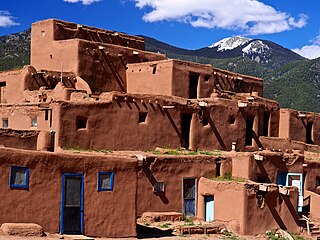
Taos Pueblo is an ancient pueblo belonging to a Taos-speaking (Tiwa) Native American tribe of Puebloan people. It lies about 1 mile (1.6 km) north of the modern city of Taos, New Mexico. The pueblos are considered to be one of the oldest continuously inhabited communities in the United States. This has been designated a UNESCO World Heritage Site.

Taos is a town in Taos County in the north-central region of New Mexico in the Sangre de Cristo Mountains. Initially founded in 1615, it was intermittently occupied until its formal establishment in 1795 by Nuevo México Governor Fernando Chacón to act as fortified plaza and trading outpost for the neighboring Native American Taos Pueblo and Hispano communities, including Ranchos de Taos, Cañon, Taos Canyon, Ranchitos, El Prado, and Arroyo Seco. The town was incorporated in 1934. As of the 2010 census, its population was 5,716.

Eanger Irving Couse was an American artist and a founding member and first president of the Taos Society of Artists. Born and reared in Saginaw, Michigan, he went to New York City and Paris to study art. While spending summers in Taos, he began to make the paintings of Native Americans, New Mexico, and the American Southwest for which he is best known. He later settled full time in Taos.

Las Trampas or just Trampas, is a small unincorporated town in Taos County, New Mexico. Founded in 1751, its center retains the original early Spanish colonial defensive layout from that time, as well as the 18th-century San José de Gracia Church, one of the finest surviving examples of Spanish Colonial church architecture in the United States. The village center was designated a National Historic Landmark District in 1967.

The Ernest L. Blumenschein House is a historic house museum and art gallery at 222 Ledoux Street in Taos, New Mexico. It was a home of painter Ernest L. Blumenschein (1874-1960), a co-founder of the Taos Society of Artists and one of the "Taos Six". It was declared a National Historic Landmark in 1965.

The Kit Carson House is a historic house museum at 113 Kit Carson Road in central Taos, New Mexico. Built in 1825, it was from 1843 until his death the home of frontiersman Kit Carson (1809-1868). A good example of Spanish Colonial architecture, it is now owned by the local Masonic fraternity, and serves as a museum dedicated to Carson's life. It was designated a National Historic Landmark in 1963.

The Mabel Dodge Luhan House, also known as the Big House, is a historic house at 240 Morada Lane in Taos, New Mexico, United States. It was designated a National Historic Landmark in 1991. It is now used as a hotel and conference center.
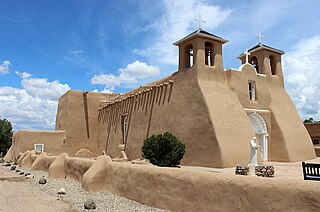
San Francisco de Asís Mission Church is a historic and architecturally significant building on the main plaza of Ranchos de Taos, New Mexico. Originally the center of a small Mexican and Indian 18th Century agricultural community. Built between 1772 and 1816 replacing an earlier church in that location. New Mexico was then part of the Vice-Royalty of New Spain. It is a fine example of a New Mexico Spanish Colonial Church, and is a popular subject for artists. It was designated a National Historic Landmark in 1970.

Ranchos de Taos Plaza is a historic district in Ranchos de Taos, New Mexico, about four miles south of the town of Taos, New Mexico. There are 21 buildings over 84 acres in the historic district, including the San Francisco de Assisi Mission Church, a U.S. National Historic Landmark.

Ojo Caliente is an unincorporated community in Taos County, New Mexico, United States.
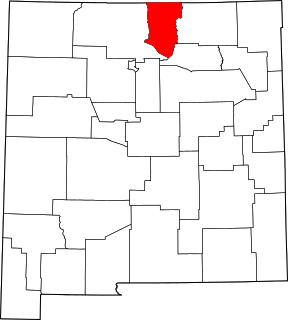
This is a list of the National Register of Historic Places listings in Taos County, New Mexico.

Taos Inn is an historic inn located in Taos, New Mexico. It is made up of several adobe houses dating from the 19th century, one of which was a home of Thomas "Doc" Martin which hosted the formative meeting of the Taos Society of Artists in 1915. After Doc's death, his widow Helen Martin converted the houses into a hotel, which opened on June 7, 1936 as Hotel Martin. The name was changed to "Taos Inn" by subsequent owners.

The Eanger Irving Couse House and Studio—Joseph Henry Sharp Studios, also known as the Couse/Sharp Historic Site, is a property on the U.S. National Register of Historic Places. It includes the home and art studio of E. Irving Couse (1866–1936) and two studio buildings owned by Joseph Henry Sharp (1859-1953), both founding members of the Taos Society of Artists. It was added to the NRHP on September 28, 2005.
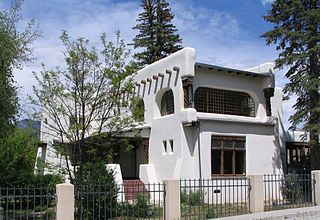
The Nicolai Fechin House in Taos, New Mexico, is the historic home of the Russian artist Nicolai Fechin, his wife Alexandra and daughter Eya. After purchasing the house in 1928, he spent several years enlarging and modifying the two-story adobe structure, for instance, enlarging the porch and adding and widening windows to take advantage of the views. He carved many of the fittings of the house and its furniture, using typical Russian design elements such as "triptych windows and intricately carved doors." The whole reflects a modernist sensibility combined with Russian, Native American and Spanish traditions.
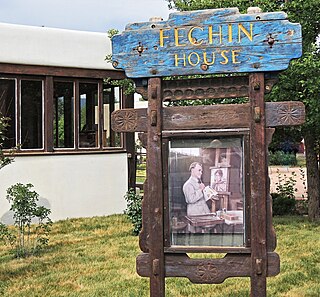
The Taos Art Museum is located in the Nicolai Fechin House, former home of Russian artist Nicolai Fechin, his wife Alexandra, and daughter Eya. The museum's primary aims are to improve awareness of the works and patronage of Taos artists and to nurture local artistic development. With many of the works of the Taos Society of Artists held by museums outside of New Mexico, they intend to "Bring Taos art back to Taos."

The Governor Bent House is the historic home of Governor Charles Bent who served as the first United States territorial governor of New Mexico.

Leon Schulman Gaspard was a Russian-born painter, known for his paintings of indigenous cultures and folk traditions. He tended to paint scenes with throngs of people, and his favorite locations were in small towns in Russia, Asia, and the Taos Valley. He spent his youth in Russia and later studied in Paris, where he became a well-respected painter. He moved with his wife, American ballerina Evelyn Adell, to the United States. They eventually settled in Taos, New Mexico, though he continued to devote much of his time to traveling to paint in remote locations.

The La Loma Plaza Historic District is a historic neighborhood in Taos, New Mexico that was listed as a National Register of Historic Places in 1982.

Harwood Foundation is a non-profit organization in Taos, New Mexico that was listed as a National Register of Historic Places in 1976. For seventy-five years, serving as a public library, museum, auditorium, classrooms and meeting rooms, the Harwood was at the heart of the social and artistic life of Taos, New Mexico.

Taos Downtown Historic District is a historic district in Taos, New Mexico. Taos "played a major role in the development of New Mexico, under Spanish, Mexican, and American governments." It a key historical feature of the Enchanted Circle Scenic Byway of northern New Mexico.























